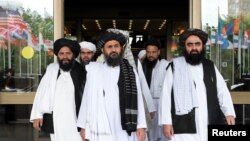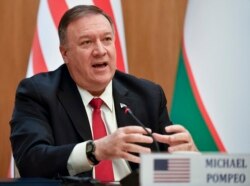The Taliban rejected charges Tuesday by the United States that the insurgent group lacks “will or capacity or both” to take steps needed to advance turbulent negotiations between the two foes aimed at ending the war in Afghanistan.
The rebuttal came a day after U.S. Secretary of State Mike Pompeo demanded “demonstrable evidence” from the Taliban it would lower the level of Afghan violence before reaching a peace deal.
“We got close once before to having an agreement: a piece of paper that we mutually executed and the Taliban were unable to demonstrate either their will or capacity or both to deliver on a reduction in violence,” Pompeo told reporters on Monday during his visit to Uzbekistan, which borders Afghanistan.
But Taliban spokesman Zabihullah Mujahid on Tuesday criticized Pompeo’s remarks and in turn accused Washington of harming the Afghan peace process.
“Mr. Pompeo should refrain from blame-shifting. Our stance is principled and concerted — unlike them [U.S.],” Mujahid said in a statement sent to reporters.
U.S. and Taliban representatives have been holding meetings in Qatar for more than a year, trying to negotiate a peace deal that would end what now has become America’s longest war.
If signed, the U.S.-Taliban pact could begin a gradual withdrawal of American troops from the country and open Taliban-Afghan negotiations on a permanent cease-fire and power-sharing in post-war Afghanistan.
But the dialogue process has suffered repeated setbacks in recent months.
President Donald Trump last September abruptly called off talks with the Taliban via a Twitter announcement just when the process had reached a decisive stage after a deadly attack resulted in the death of a U.S. service member. The two negotiating teams returned to the table in December.
Last week, the U.S.-backed government in Kabul quoted Washington’s chief negotiator Zalmay Khalilzad as telling Afghan President Ashraf Ghani there had been no “notable progress” in talks with the Taliban.
The Trump administration is demanding a “significant and lasting” reduction in insurgent violence, while the Taliban has refused to go beyond its proposed weeklong scaling back of operations until a deal is signed.
Taliban spokesman Mujahid asserted his group has “the intention and capacity” for seeking a resolution to the war in Afghanistan, but he blamed President Trump’s September tweet and “numerous U.S. demands and quarrels” between American and Afghan officials for hampering the dialogue process.
The Afghan government has demanded there be a monthlong nationwide insurgent cease-fire before a U.S.-Taliban deal is concluded. American officials have been pressing the Taliban, however, to continue a reduction in violence until intra-Afghan negotiations open, knowing the insurgents would not agree to a complete cessation of hostilities.
Pompeo, while speaking Monday, also referred to challenges facing Washington in trying to end what Trump has referred to as America’s endless war and bring home roughly 13,000 troops deployed to Afghanistan.
"So we’re working on a peace and reconciliation plan, putting the commas in the right place, getting the sentences right. In the end, all Afghans will have to resolve that they want peace and stability for their own country, as well. That’s certainly the Taliban, but it’s others, too.”






